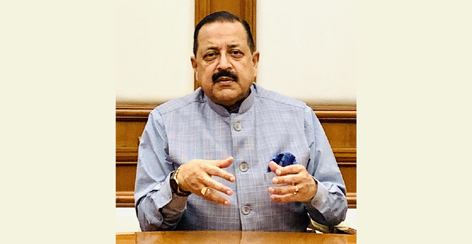
Excelsior Correspondent
NEW DELHI, Sept 15: Union Minister of State Science & Technology; Earth Sciences (IC); MoS PMO, Personnel, Public Grievances, Pensions, Atomic Energy and Space, Dr Jitendra Singh today said that India is fast emerging as world space hub for cost-effective launch of satellites.
Speaking at the India Leads-2021 Summit organized by FICCI here, he said, India has earned worldwide recognition for launching lunar probes, building satellites, ferrying foreign satellites up and has even succeeded reaching Mars with Mangalyaan being there continuously for a number of years.
Dr Jitendra Singh said, over the past few years, Space Industry is emerging as one of the most lucrative industries globally and demand for Nano, micro and mini satellites and re-usable and small satellite launch vehicle systems are anticipated to drive the market. He informed that ISRO has forged a strong relationship with many industrial enterprises, both in the public and private sector, to implement its space projects.
With the ISRO undertaking the development of cutting-edge technologies and interplanetary exploratory missions, there is a tremendous scope in contributions to the realization of operational missions and new areas such as satellite navigation, he added.
Dr Singh said, while India is becoming a major player in the world comity of nations, it is a matter of pride that India’s ascent to the top will be contributed to a large extent by its superiority in the Space capabilities. World today is enamored of Chandrayaan, Mars mission and upcoming Gaganyan, the Minister added.
He said, space and satellite technology is today being extensively used in railways, road and bridge construction, agriculture, soils, water resources, forestry and ecology, housing, tele-medicine, disaster management and accurate weather forecast to name a few.
Referring to the topic of the Summit “Future of India-Oceania Space Technology Partnerships”, Dr Singh said, India is all set to become the hub for the small satellite launch market, which is estimated to be valued at around $38 billion by 2027. He added that Australia and New Zealand on the other hand have emerging capabilities in design and manufacture of nano- and micro-satellites including high performance optics, radio communications systems, optical communications systems and on-board data handling maneuvering. He said, other Oceania countries such as New Zealand and Pacific island countries can collaborate with India and can jointly develop and identify space technological solutions and innovative products to explore partnerships and joint ventures.
Dr Singh said, Australia and India have been partnering since 1987 to support data calibration and laser raging for Indian satellites, launching Australian satellites, and conducting joint research.The Minister also noted with satisfaction that the Australian Space Agency is working closely with the ISRO on India’s first manned mission into space, Gaganyaan, sprucing up its temporary ground station tracking facilities in Australia for the mission.
He informed that India has signed various Memoranda of Understanding (MoU) with other countries and organizations as an initiative to expand its international outreach. He said, the areas of cooperation are mainly concerned with remote sensing of the earth, airborne synthetic aperture radar, maritime domain awareness, satellite communication, launch services, space exploration, space law and capacity building.
Dr Singh highlighted some of the key achievements of Indian Space industry like India’s first space observatory, ASTROSAT four years in space and has more than 900 registered users from 24 countries, a major milestone in 2017 with a successful record-setting launch of 104 satellites on a single rocket, India’s most powerful launch vehicle, GSLV-MK III capable of launching 4 tons of satellites into Geosynchronous Transfer Orbit (GTO) was successfully launched in July, 2019. The country has to its credit – 109 spacecraft missions, 77 launch missions, 10 student satellites, 2 Re-entry missions and 319 foreign satellites, he added.
Dr Sangita Reddy, Immediate Past President, FICCI and Joint Managing Director, Apollo Hospitals, Anthony Murfett, Deputy Head, Australian Space Agency, Australia, Jason Held, CEO, Saber Astronautics, Australia, Dr D Radhakrishnan, CMD, New Space India Limited (NSIL), Professor Andy Koronios, CEO & Managing Director, SmartSat CRC, Australia and Vikram Chandra, Founder Editorji Technologies graced the occasion.

